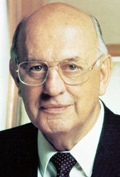 |
Pieter Willem Botha
b. 12 Jan 1916, "Telegraaf", Paul Roux district, Orange Free State Province
d. 31 Oct 2006, "Die Anker", near Wilderness, Western Cape Province |
| Title: |
Acting State President of the Republic of South Africa :: Waarnemende Staatspresident van die Republiek van Suid-Afrika |
| Term: |
3 Sep 1984 - 14 Sep 1984 |
| Chronology: |
3 Sep 1984, designated by the Ministers in accordance with the Repubulic of South Africa Constitution Act, 1983, Art. 102 (1) [1][2] |
| |
3 Sep 1984, took an oath of office as Acting State President [1] |
| Title: |
State President of the Republic of South Africa :: Staatspresident van die Republiek van Suid-Afrika |
| Term: |
14 Sep 1984 - 15 Aug 1989 |
| Chronology: |
5 Sep 1984, elected, session of an electoral college consisting of the members of the House of Assembly, House of Representatives, and House of Delegates, chamber of the House of Assembly, Cape Town [3] |
| |
14 Sep 1984, took an oath of office as State President, public ceremony, Groote Kerk, Cape Town [4] |
| |
15 Aug 1989, ceased to exercise the functions of office upon lodging his resignation in writing with the Chief Justice [5] |
| Biography: |
| Son of a wealthy Free State farmer who fought as a commando against the British invasion in the South African War (1899-1902); during the war his mother was interned in a British concentration camp; was educated at Paul Roux and matriculated from the Voortrekker secondary school at Bethlehem (1933); began reading law (1934) at Grey University College (now University of the Free State), Bloemfontein; worked as a part-time reporter for Die Volksblad and was an active member of the National Afrikaans Student Association (Afrikaanse Nasionale Studentebond); began his political career, helping to organize the Purified National Party (Gesuiwerde Nationale Party, GNP); abandoned his studies to become GNP organizer in the Western Cape (1936); along with Balthazar Johannes Vorster and Theophilus Ebenhaezer Dönges, he helped form the Cape Town branch of the Ossewa-Brandwag (Ox-wagon Sentinel) and became the organization's leader for the Cape; joined the Reunited National Party (Herenigde Nasionale Party, HNP; from 1951 Nasionale Party); was expelled from the Ossewa-Brandwag in 1941; unsuccessfully contested the election to the House of Assembly in 1943; promoted within the HNP to Union Information Officer (1946); elected to the House of Assembly as a member for the constituency of George, Cape Province (1948-1984); held the post of HNP chief secretary for the Cape Province (1948-1958); appointed deputy minister of the interior (1958-1961); was known for his staunch support of segregational policy of Hendrik Verwoerd; served as minister of community development and coloured affairs (1961-1966), minister of public works (1964-1966), minister of defence (1966-1980); was unanimously elected leader of the National Party in the Cape Province (1966-1978); as minister of defence, he was efficient in turning South Africa into a country self-sufficient in the manufacture of weapons; served as Leader of the House of Assembly (1976-1978); succeeded Vorster as Leader of the National Party (1978-1989) and Prime Minister (1978-1984); though under heavy attack from right-wing groups, he pressed ahead with his plans for constitutional change; engineered the abolition of the Senate (1980); won overwhelming support in the referendum on a new constitution, establishing a tri-cameral parliamentary system and strong executive (1983); elected State President (14 Sep 1984 - 15 Aug 1989); suffered a stroke (18 Jan 1989) and resigned as Leader of the National Party (2 Feb 1989); refused to attend the hearings of the Truth and Reconciliation Commission, a body set up to investigate the abuses of human rights in the period of racial segregation; was found guilty of contempt of the law, fined and sentenced to a suspended 12-month prison term (1998), but this ruling was overturned on appeal. |
| Biographical sources: "PW", by Dirk and Johanna de Villiers (Cape Town: Tafelberg, 1984) |
| |
| [1] |
Government Gazette, No. 9427, 13 Sep 1984, p. 1. |
| [2] |
Government Gazette, No. 8914, 28 Sep 1983, p. 64: "If section 19 (1) (b) comes into operation before the first State President has been elected in terms of this Act and has assumed office, a person designated by the Ministers referred to in subsection (2) of this section from among their number, shall serve as Acting State President, and such or any other Acting State President or the State President may exercise any power conferred upon the State President by this section or section 103 but not yet exercised by the State President referred to in section 103 (1) at the commencement of section 19 (1) (b)." |
| [3] |
Government Gazette, No. 9410, 5 Sep 1984, p. 1; Rand Daily Mail, 6 Sep 1984, p. 5. |
| [4] |
Government Gazette, No. 9423, 14 Sep 1984, p. 1. |
| [5] |
Government Gazette, No. 12059, 16 Aug 1989, p. 1. |

